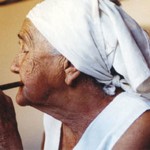Dir. Eduardo Coutinho
“We want to hear stories,” director Eduardo Coutinho says early in this film, which is built almost entirely from interviews he conducted over a two-week period in Paraiba, a backlands town in in the northeast of Brazil. Specific stories. Intimate, personal stories. Ten minutes or so into the film, as a man in medium close-up describes the hard circumstances of his life, Coutinho drowns him out with his own voice-over narration, informing us that this story won’t do, that it lacks the “closeness” he’s seeking. And so, with the help of Rosa, his young guide, he focuses instead on the community where she lives, a small network of aged kin who’ve given their lives to the hard land they live on.
Many of the people Coutinho interviews inhabit the same homes where they were born six, seven decades earlier. Their skin is hard and deep-lined, and their stories are similar: each began a life of labor during childhood, only a few received a formal education; there were marriages (most of them successful, or so they say) and many, many pregnancies. We learn about all of this from their lively, impassioned, and occasionally bitter remembrances. Coutinho, we discover in a surprising two-shot near the very end of the film, sits quite close to his interviewees (typically, they’re framed in tight close-ups), earning their trust and fondness.
Very much like a film I saw here at SFIFF two years ago, Raymond Depardon’s Profiles of Farmers: Daily Life, The End and the Beginning is, in Coutinho’s words, “a tale of a life that is rapidly disappearing.” Frankly, I remember almost nothing of Depardon’s film, but I suspect Coutinho’s will linger with me for quite a while, partly due to the charm of his subjects, but also because, in acknowledging its position as a work of documentary — the first words of the voice over tell us that the film “began from scratch”; the crew simply drove out of Rio de Janeiro and showed up in Paraiba — The End and the Beginning also serves as a kind of test case, giving a media(ted) voice to people who have never had one before but never pretending that such mediation is without moral and political consequence.
When Coutinha returns to each of his interviewees to say a final goodbye, there is genuine sadness in their faces (or at least in the faces that made the final cut). Earlier, one man in particular had expressed misgivings about appearing on camera, saying that he felt his words would be spoken “in vain.” When Coutinha asks him what he means, he says, “a word in vain is a word with no future.” The line resonates throughout his final on-camera appearance. In the intervening days he’s apparently thought a great deal about filmmaking. He suggests, even, that Coutinho shoot him from a different angle, then he laughs, and instantly we imagine him alone in front of a mirror, turning and looking through the corners of his eyes at his right profile then the left and back again. Given an opportunity, finally, finally, to tell his story, he regrets that the chance has passed so quickly. “You’re a smart and interesting man,” Coutinho tells him. “I have more to tell,” he says.
